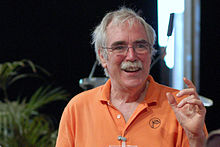
Eric F. Wieschaus

Eric Francis Wieschaus | |
|---|---|
 Eric F. Wieschaus in 2011 | |
| Born | June 8, 1947 South Bend, Indiana, U.S. |
| Alma mater | University of Notre Dame (B.S.) Yale University (Ph.D.) |
| Known for | Embryogenesis |
| Awards | Genetics Society of America Medal (1995) Nobel Prize in Physiology or Medicine (1995) |
| Scientific career | |
| Fields | Developmental biology |
| Institutions | Princeton University Robert Wood Johnson Medical School |
Eric Francis Wieschaus (born June 8, 1947 in South Bend, Indiana) is an American evolutionary developmental biologist and 1995 Nobel Prize-winner.

Early life
Born in South Bend, Indiana, he attended John Carroll Catholic High School in Birmingham, Alabama before attending the University of Notre Dame for his undergraduate studies (B.S., biology), and Yale University (Ph.D., biology) for his graduate work.

Scientific career

In 1978, he moved to his first independent job, at the European Molecular Biology Laboratory in Heidelberg, Germany and moved from Heidelberg to Princeton University in the United States in 1981.[1][2]

Much of his research has focused on embryogenesis in the fruit fly Drosophila melanogaster, specifically in the patterning that occurs in the early Drosophila embryo. Most of the gene products used by the embryo at these stages are already present in the unfertilized egg and were produced by maternal transcription during oogenesis. A small number of gene products, however, are supplied by transcription in the embryo itself. He has focused on these "zygotically" active genes because he believes the temporal and spatial pattern of their transcription may provide the triggers controlling the normal sequence of embryonic development. Saturation of all the possible mutations on each chromosome by random events to test embryonic lethality was done by Eric Wieschaus.[3] This body of science eventually was termed the Heidelberg screen.[2][4]

In 1995, he was awarded the Nobel Prize in Physiology or Medicine with Edward B. Lewis and Christiane Nüsslein-Volhard as co-recipients, for their work revealing the genetic control of embryonic development.[5][6][7][8]

As of 2018, Wieschaus is the Squibb Professor in Molecular Biology at Princeton.[9] He was formerly Adjunct Professor of Biochemistry at the University of Medicine and Dentistry of New Jersey – Robert Wood Johnson Medical School.

Personal life
He has three daughters and is married to molecular biologist Gertrud Schüpbach, who is also a professor of Molecular Biology at Princeton University, working on Drosophila oogenesis.[citation needed]

Wieschaus is an atheist and is one of the 77 Nobel Laureates who signed the 2007 petition to repeal the Louisiana Science Education Act.[10][11]

Awards and honors
- Member of the American Academy of Arts and Sciences, elected 1993[12]
- Member of the National Academy of Sciences, elected 1994[13]
- Nobel Prize in Physiology or Medicine, 1995
- Member of the American Philosophical Society, elected 1998[14]
- Mendel Medal of the Genetics Society, 1999[15]
References
- ^ Eric F. Wieschaus on Nobelprize.org
- ^ a b Wieschaus, E.; Nüsslein-Volhard, C. (2016). "The Heidelberg Screen for Pattern Mutants of Drosophila: A Personal Account". Annual Review of Cell and Developmental Biology. 32: 1–46. doi:10.1146/annurev-cellbio-113015-023138. PMID 27501451.
- ^ Connor, S. (1995), "Nobel prize given for work on fruit flies", BMJ, vol. 311, no. 7012 (published October 21, 1995), p. 1044, doi:10.1136/bmj.311.7012.1044, PMC 2551360, PMID 7580653
- ^ St Johnston, D. (2002). "The art and design of genetic screens: Drosophila melanogaster". Nature Reviews. Genetics. 3 (3): 176–88. doi:10.1038/nrg751. PMID 11972155. S2CID 6093235.
- ^ Gruenbaum, J. (1996), "[Nobel prize winners in medicine—1995]", Harefuah, vol. 130, no. 11 (published June 2, 1996), pp. 746–748, PMID 8794677
- ^ Blum, H. E. (1995), "[The 1995 Nobel Prize for medicine]", Dtsch. Med. Wochenschr., vol. 120, no. 51–52 (published December 22, 1995), pp. 1797–800, doi:10.1055/s-0029-1234219, PMID 8549267, S2CID 260117108
- ^ Molven, A. (1995), "1995 Nobel Prize in physiology and medicine. The mystery of fetal development", Tidsskr. Nor. Laegeforen., vol. 115, no. 30 (published December 10, 1995), pp. 3712–3, PMID 8539733
- ^ Cohen, B. (1995), "Nobel committee rewards pioneers of development studies in fruitflies", Nature, vol. 377, no. 6549 (published October 12, 1995), p. 465, Bibcode:1995Natur.377..465C, doi:10.1038/377465a0, PMID 7566128
- ^ "Eric Wieschaus | Squibb Professor in Molecular Biology". Princeton University. Retrieved May 8, 2018.
- ^ Lau, Tatiana (April 17, 2007). "Nobel-winning professor tells story of his own life in religion, science". The Daily Princetonian. Archived from the original on August 21, 2016.
- ^ "77 Nobel Laureates Call for a Repeal of the LSEA | Repealing the Louisiana Science Education Act". Archived from the original on May 28, 2016. Retrieved August 7, 2016.
- ^ "Eric F. Wieschaus". American Academy of Arts & Sciences. Retrieved May 16, 2020.
- ^ "Eric Wieschaus". www.nasonline.org. Retrieved May 16, 2020.
- ^ "APS Member History". search.amphilsoc.org. Retrieved May 16, 2020.
- ^ "Mendel Medal". Genetics Society. Retrieved May 16, 2020.
External links
- Eric Wieschaus's Short Talk: "Finding Genes that Control Development"
- Eric F. Wieschaus on Nobelprize.org including the Nobel Lecture on December 8, 1995 From Molecular Patterns to Morphogenesis: The Lessons from Drosophila
- American Society for Cell Biology, excellent profile
- The Wieschaus lab
- A Conversation with Eric F. Wieschaus
- 1947 births
- Living people
- American geneticists
- American Nobel laureates
- American atheists
- Members of the European Molecular Biology Organization
- Notre Dame College of Arts and Letters alumni
- Yale Graduate School of Arts and Sciences alumni
- Nobel laureates in Physiology or Medicine
- Members of the United States National Academy of Sciences
- Recipients of the Pour le Mérite (civil class)
- Duke University faculty
- Princeton University faculty
- People from South Bend, Indiana
- Howard Hughes Medical Investigators
See what we do next...
OR
By submitting your email or phone number, you're giving mschf permission to send you email and/or recurring marketing texts. Data rates may apply. Text stop to cancel, help for help.
Success: You're subscribed now !

